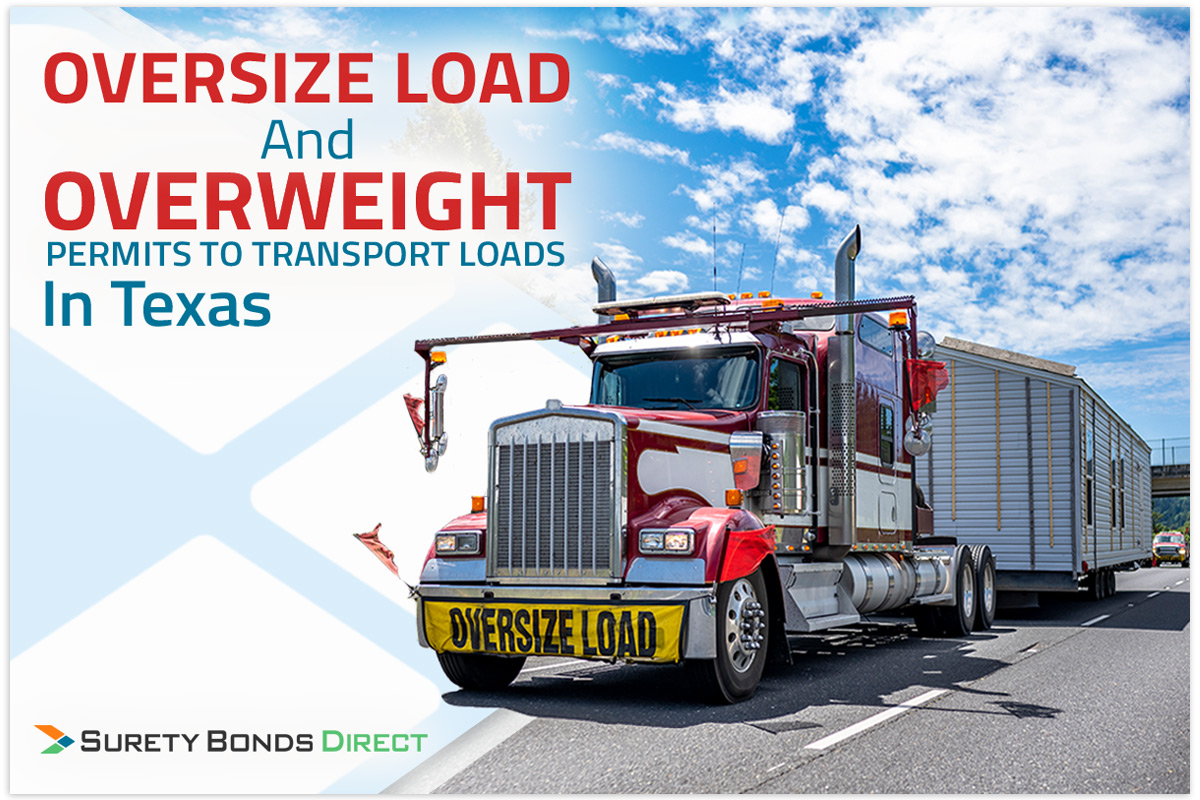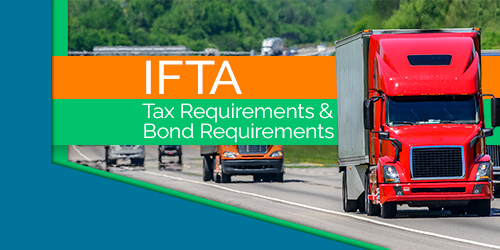The Federal government has size limits to travel across the National System of Interstate and Defense Highways. These limits are in place to protect the road systems from excessive damage due to "heavy" loads.
Individual states have size limits to travel on state highways and county roads. Just like the Federal government, these limits are enforced to protect the road systems from excessive damage because of “heavy” loads.
What Is A "Heavy" Load?
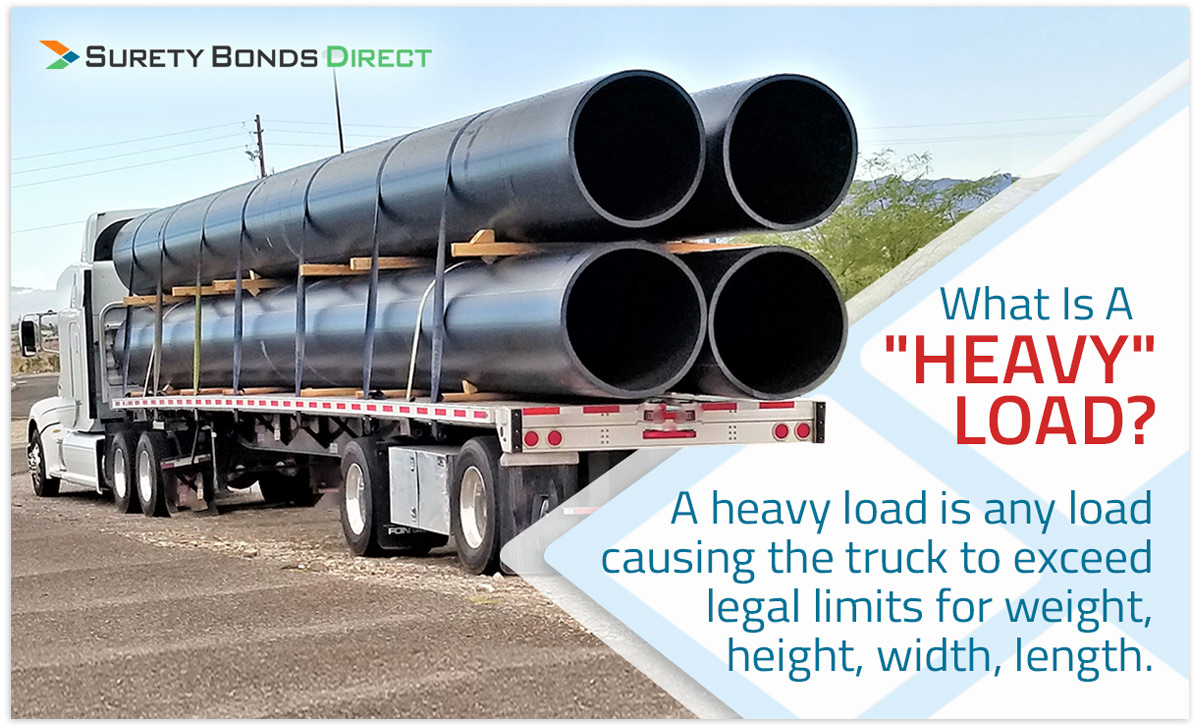
A heavy load is any load causing the truck to exceed legal limits for:
Weight
Height
Width
Length
These "heavy" loads are not illegal. They require a special permit provided by each state. Each state has its own unique set of load and size regulations, requiring a permit.
Texas is one of the few states who require trucking companies to post an Overweight and Oversized surety bond. We'll cover the purpose of these bonds and how much it costs, plus how to get your bond fast.
Part of the permitting process is recording:
- Weight of the vehicle.
- Weight distribution of the vehicle.
- Dimensions.
- Potentially the route you're going to take.
Texas has route requirements only if specific dimensions are exceeded. These requirements are listed below.
Route requirements allow the truck to:
- Avoid specific bridges which can't handle heavy load weights).
- Avoid underpasses if there are height restrictions.
- Help with coordinating transportation through cities or specific counties.
- Keep the load safe.
- Keep the roads and structures along the route safe.
Two Types of "Heavy" Load Classifications
Non-Divisible Loads
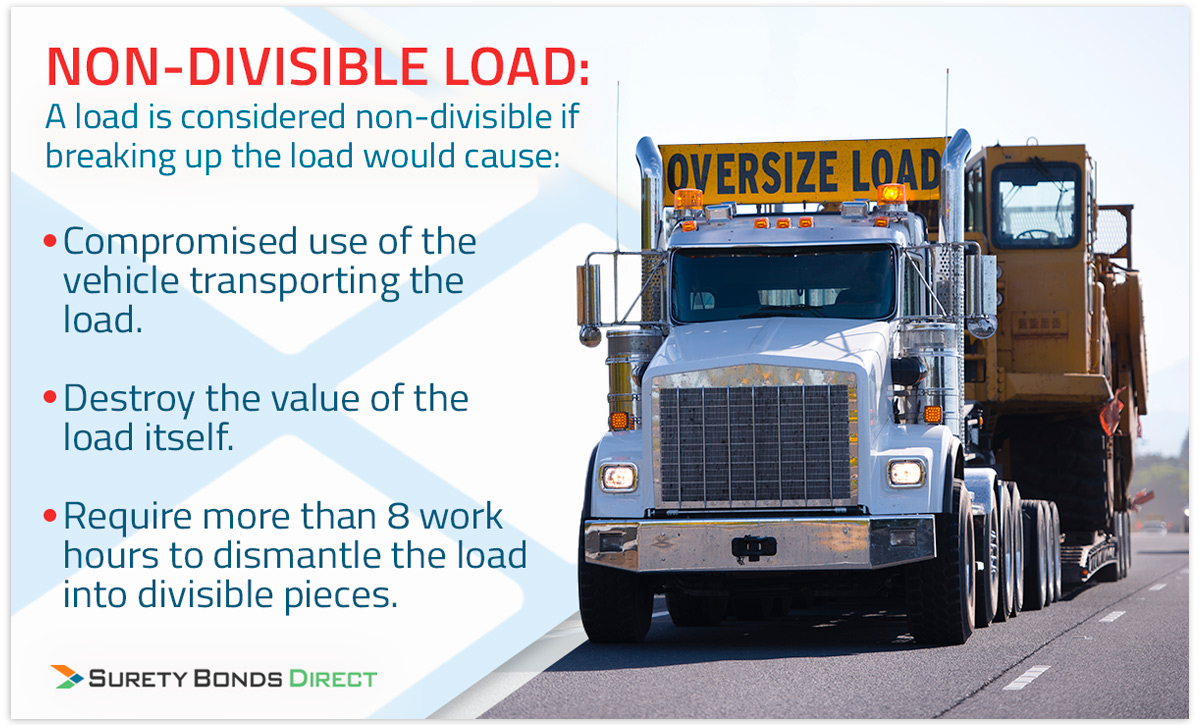
A load is considered non-divisible if breaking up the load would cause:
- Compromised use of the vehicle transporting the load.
- Destroy the value of the load itself.
- Require more than 8 work hours to dismantle the load into divisible pieces.
In Texas, there are many "heavy" loads which meet this non-divisible load classification.
- Heavy construction vehicles
- Military vehicles
- Manufactured housing
- Oil industry machinery
- Tanks, boilers, and containers
Divisible Loads
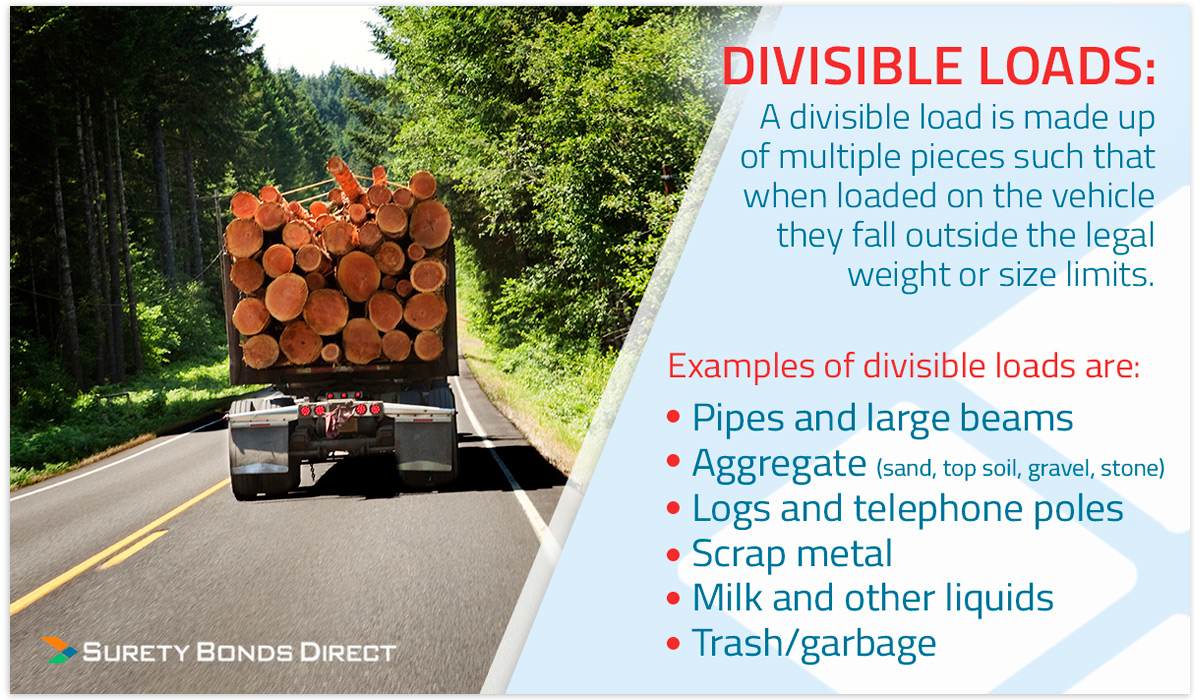
A divisible load is made up of multiple pieces such that when loaded on the vehicle they fall outside the legal weight or size limits.
Examples of divisible loads are:
- Pipes and large beams
- Aggregate (sand, top soil, gravel, stone)
- Logs and telephone poles
- Scrap metal
- Milk and other liquids
- Trash/garbage
Specific Texas Requirements
Here are the legal limits for transporting loads through Texas. Anything outside these limits will require a special overweight and/or oversized permit.
| Texas Legal Limits | |
|---|---|
| Width | 8 feet 6 inches |
| Height | 14 feet |
| Length | |
| Semitrailer or two vehicle combination | 59 feet |
| Each trailer or semitrailer of a twin-trailer combination | 28.5 feet |
| Truck towing a trailer carrying a boat | 65 feet |
| Front overhang | 3 feet |
| Rear overhang | 4 feet |
Here is the full list based on vehicle.
Texas follows the Federal requirements for weight. (Some states have different weights for state highways and county roads.)
| Texas Weight Limits | |
|---|---|
| Gross | 80,000 pounds (max including trailer) |
| Single Axle | 20,000 pounds |
| Tandem Axle | 34,000 pounds |
| Triple Axle | 42,000 pounds |
| Quad Axle | 50,000 pounds |
The axle group must have a minimum spacing of 40 inches between the axles within the axle group.
The distance between the axles is important as each axle has a weight limit. Here's a table of permissible weights following the "bridge" formula.
A "bridge formula" is used to help determine if the distance between axle groups is appropriate for transportation over bridges. The idea is to distribute the total weight across the vehicle so it's not focused on any one section of a bridge.
FORMULA
Overweight, Oversized Permit Limits
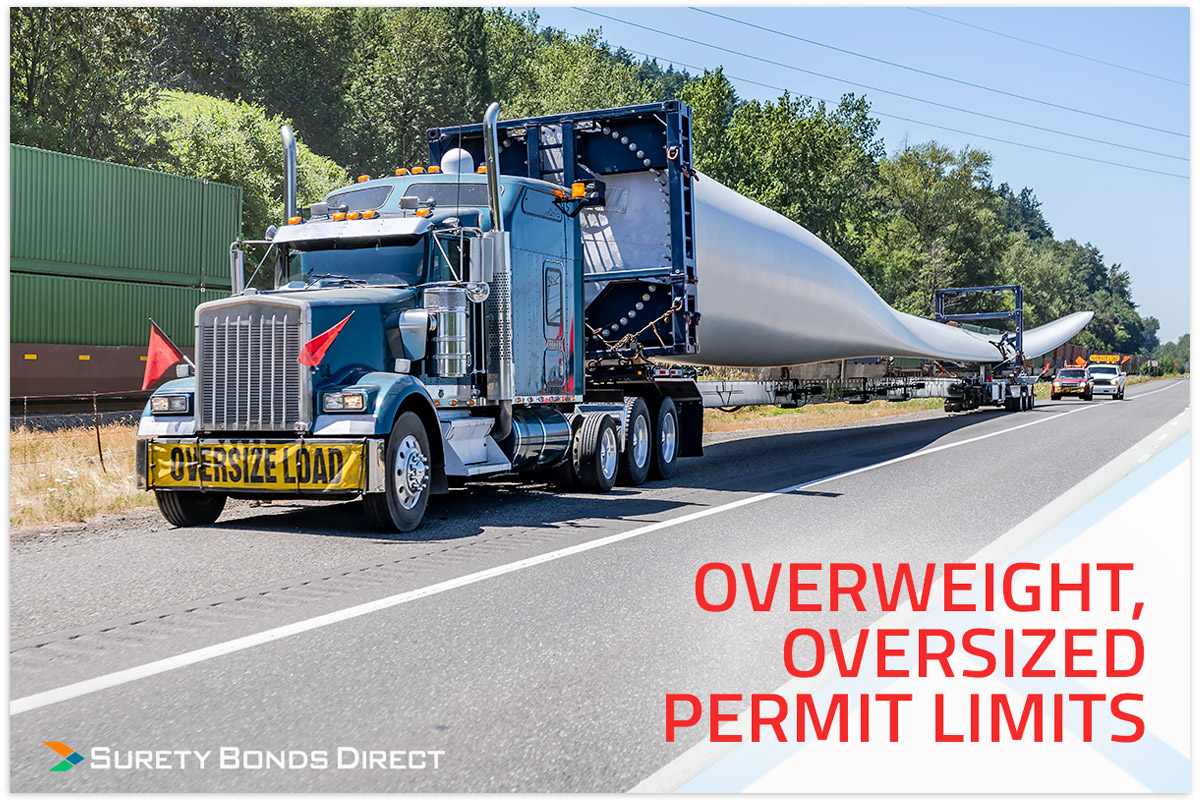
Even with a oversize or overweight permit, there are dimension and weight requirements you must fall within. In rare cases you will have to get a Super Heavy Permit depending the load you're carrying.
| Texas Overweight Limits | |
|---|---|
| Width | |
| Maximum permitted on holidays | 14 feet (except for manufactured housing) |
| Maximum on Interstate Highway Systems | 16 feet |
| Maximum permitted without route inspection | 20 feet |
| Height | |
| Maximum permitted on holidays | 16 feet |
| Maximum permitted without route inspection | 18 feet 11 inches |
| Anything over 18 feet 11 inches requires a route inspection because of underpasses. | |
| Length | |
| Maximum permitted on holidays | 110 feet |
| Truck or single vehicle | 75 feet |
| Front overhang | 25 feet |
| Rear overhang | 30 feet |
| Maximum permitted without route inspection | 125 feet |
| Weight | |
| Single Axle | 25,000 pounds |
| Tandem Axle | 46,000 pounds |
| Tridem Axle | 60,000 pounds |
| Quadrem Axle | 70,000 pounds |
| Quint Axle | 81,400 pounds |
Special Rules:
- If two or more consecutive axle groups have spacing between them of less than 12 feet, the weight can be reduced by 2.5% per foot under 12 feet.
- The weight across axle groups should be distributed equally. The difference between any axle group should not be more than 10%.
There are more specific requirements Texas outlines on their size and limits page.
Super Heavy Permit
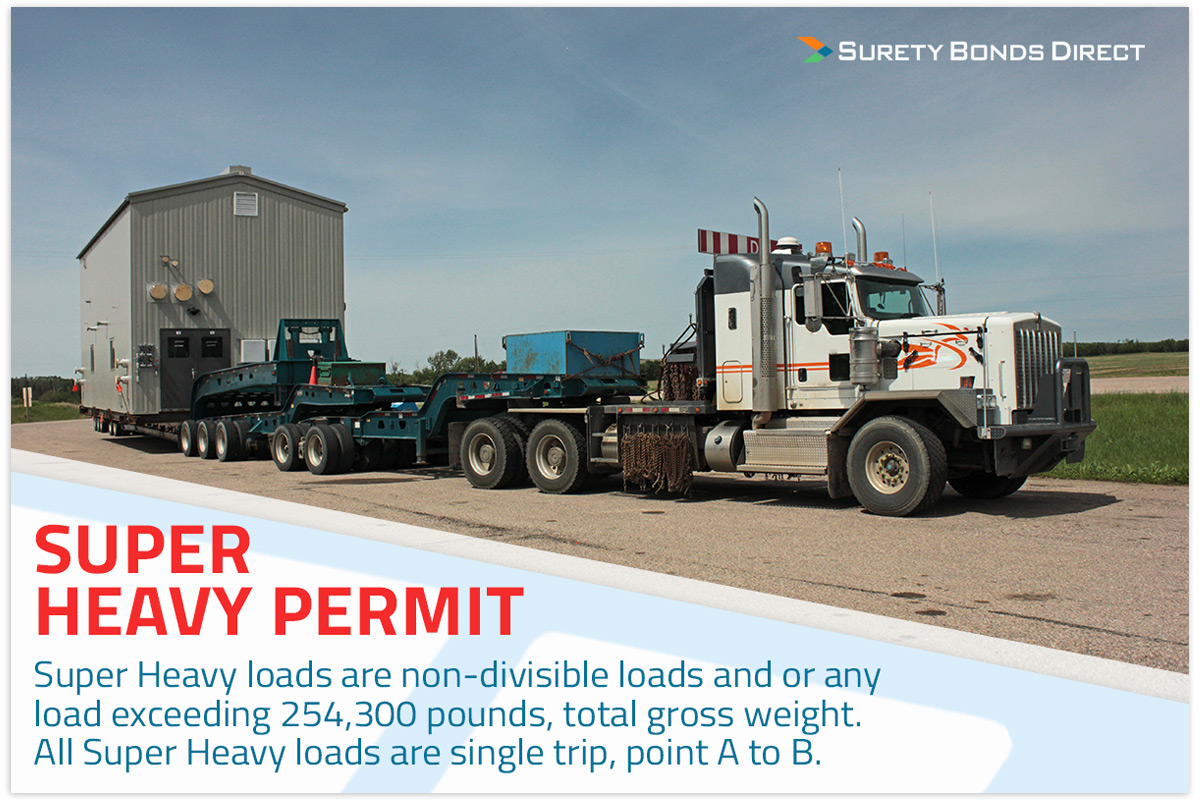
Super Heavy loads are non-divisible loads and or any load exceeding 254,300 pounds, total gross weight. All Super Heavy loads are single trip, point A to B.
There are further requirements for obtaining a Super Heavy permit like:
- The loads center of gravity
- The distance from the center or gravity to the front bolster.
- The distance from the front bolster to the center of the fifth wheel of the truck.
- Here's the full list for super heavy permits.
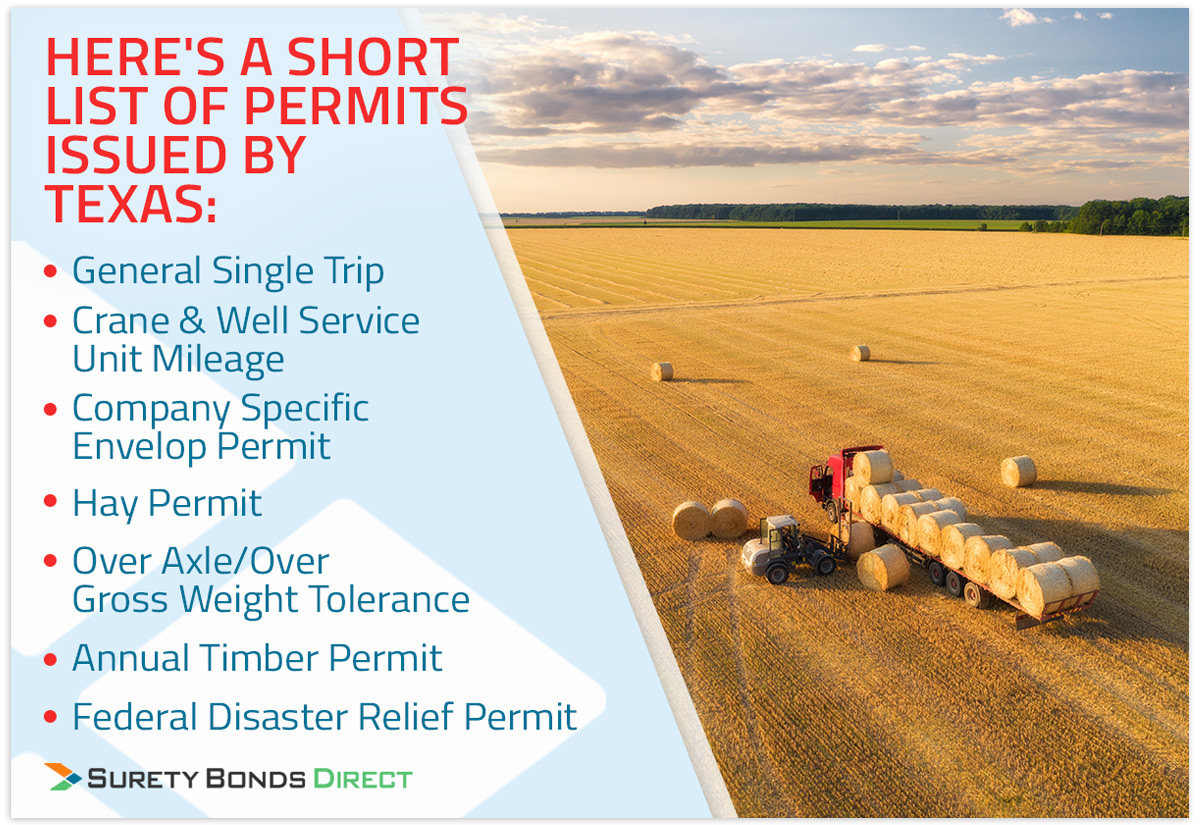
| Permit Type | Permit Details |
|---|---|
| General Single Trip |
|
| Crane & Well Service Unit Mileage |
|
| Company Specific Envelop |
|
| Hay Load |
|
| Over Axle/Over Gross Weight Tolerance |
|
| Annual Timber Permit |
|
| Federal Disaster Relief Permit |
|
Here's the full list of Texas Overweight and Oversized permits.
Route Inspections
In Texas, route inspections are required if you're vehicle or load exceeds one of the following dimensions:
- Width: 20 feet
- Height: 18 feet and 11 inches
- Length: 125 feet
Routes inspections are required for the safety of the load, the road and bridge infrastructure, plus public safety.
A good example would be an oversized load passing through the corporate limits of a city. The time of this passage would be scheduled so law enforcement can help provide safe transport through more densely populated areas with smaller roads for lane closures.
Purchase Oversized And Overweight Permit Bond
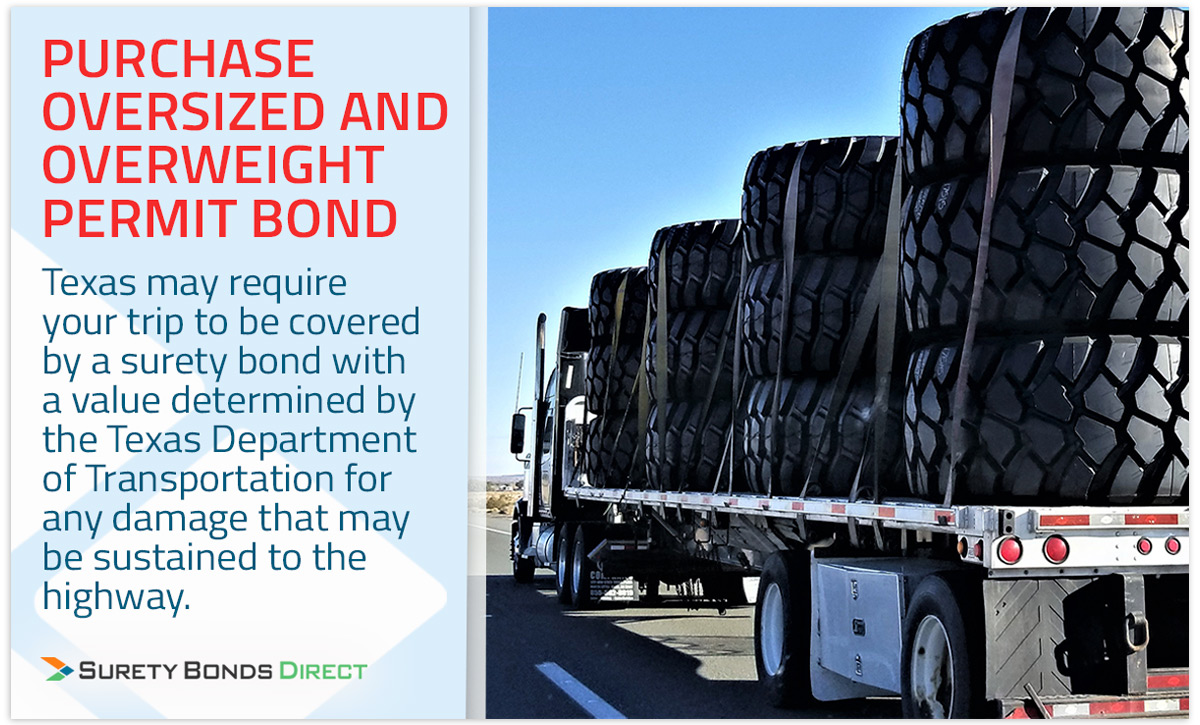
Texas may require your trip to be covered by a surety bond with a value determined by the Texas Department of Transportation for any damage that may be sustained to the highway or road system.
This bond must meet the following requirements:
- Filed with the Texas DMV before a permit is issued.
- Issued by a resident Texas agent or a non-resident agent with a valid Texas insurance license on behalf of an authorized insurance company. (Surety Bonds Direct has a valid Texas insurance license.)
- Issued on form 439 for $10,000 bond amount.
- Over axle and over gross weight tolerance permit bonds have a $15,000 bond amount.
- Must have a notary seal or power of attorney.
- Sign by an authorized person from the company requesting the bond.
- The company name an address needs to be printed on the face of the bond.
You may need to purchase an annual over axle and over gross weight tolerance permit bond. With this permit, vehicles are allowed:
- To exceed the legal axle weight by a tolerance of 10%
- And exceed the gross weight by a tolerance of 5%
Vehicles traveling under this permit are allowed on county roads and state maintained roadways within the counties listed on the permit. No travel on the Interstate Highway System is allowed.
The bond must be renewed every year prior to August 31.
What Is A Permit Surety Bond?
A surety bond is a promise of financial responsibility purchased by the carrier to guarantee safe transport of goods without unnecessary damage to road systems or structures close to roads.
If significant damage to a road or road structure occurs, the state of Texas can make a claim on this surety bond. The claim will go through an investigation and the surety company who issued the bond will guarantee payment to the state for the claim amount.
The carrier will pay the surety company back the amount of the claim.
Here is a full surety bond definition to break down the relationship between the carrier... the obligee (the state government)... and the surety company.
How Much Does A $10,000 Oversized/Overweight Bond Cost?
If you're purchasing an annual over axle and over gross weight tolerance bond, the costs are below:
| Permit Type | Amount Amount | Purchase Amount |
|---|---|---|
| Over axle and gross weight tolerance permit | $15,000 | |
| Superheavy or oversize permit bond | $10,000 | |
| Custom oversize or overweight per county | $10,000 or custom amount |
A $10,000 superheavy or oversize permit bond costs $100 and expires every year on August 31.
Surety Bonds Direct is a certified surety company or broker who can help you find the lowest-cost rate on your $10,000 oversized and overweight permit bond. You can request a free quote online and we'll reach back out to you or you can call us today at 1800-608-9950 and talk to a surety bond expert in oversized and overweight permit bonds.
